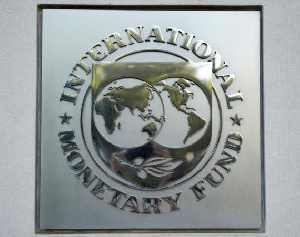 File photo of the new IMF logo
File photo of the new IMF logo
The Civil Society Platform has advised government to position itself economically to avoid going back to the International Monetary Fund (IMF) after its exit from the programme in 2018.
It explained that gross indiscipline in the management of Ghana’s resources had been responsible for the country’s financial woes.
However, to restore policy credibility and macro-economic stability due to poor economic management and enhance investor confidence, the current government asked for a one-year extension of the IMF programme to address key challenges.
At the opening of the Fifth National Annual Civil Society Forum in Accra on Thursday, June 28, 2018, Francis Tsegah, a former Ambassador and Senior Research Fellow with the Ghana Centre for Democratic Development (CDD), urged the government to make more efforts to strengthen fiscal discipline.
He said although the government had announced an exit from the programme by the close of 2018, the fiscal performance under the current ECF-backed programme has been generally disappointing.
The forum, which was put together with support from Oxfam, was to review the three-year implementation of Ghana’s 16th Stabilisation Programme with the IMF and see how the country would avert another stabilisation programme with the Fund.
Senanu Klutse, an economist with the Centre for Policy Analysis (CEPA) in a presentation on the IMF programme monitoring results, attributed the poor fiscal performance to persistent deterioration of tax efforts right from the beginning of the programme.
He said expenditures were also officially reported to have been “controlled” sharply in response to the shortfall in revenue and grants.
He said the excess spending on 2016 election was arguably the worst in the Fourth Republic.
Mr Klutse, however, said although the government may have good reasons for the future, past lessons should be properly learnt, adding that repeated episodes of large fiscal slippages had transmitted significant volatility to the economy.
This, he said, had contributed to sizable depreciation, high inflation, widening domestic and external imbalances and rising public debt burden.
He indicated that attempts to correct such imbalances had been short-lived as good intentions had floundered against the challenge of budget rigidities, economic inefficiencies, vested interests and corrupt practices.
Mr. Kluste said going forward, primacy must be given to the pursuit of credible and sustained fiscal consolidation to reverse the debt dynamics and reduce financing needs.
He said the government must not only accept the constraints on spending of the weak economy it had inherited, but communicate the reality of the situation to its support base and society at large.
“The ruling NPP won a mandate to pursue macro-economic stability and create prosperity and opportunity for all Ghanaians, hence the implementation of the election promises would need to be carefully sequenced, policies clearly and consistently communicated with the view to minimising partisanship and get the buy-in of the citizenry.
This, it said, should help anchor expectations and better lay the seeds for lasting success of the new policy initiatives.
He noted that despite PFM reforms and implementation of GIFMIS, fiscal slippages had raised legitimate concerns about government’s ability to rein in spending.
“Opting out of the programme prematurely would mean the immediate withdrawal of financial support from the IMF, the World Bank and other development partners, leading to a further weakening of the investor confidence.
He said successful completion of the programme would mean an increased role for CSOs going forward in its role to, among other things, hold the government responsible for much improved data transparency to ensure good economic governance.